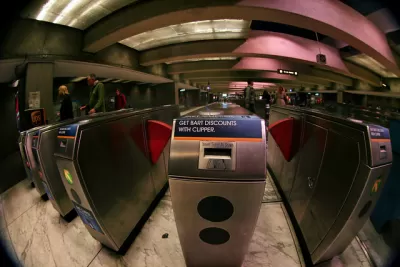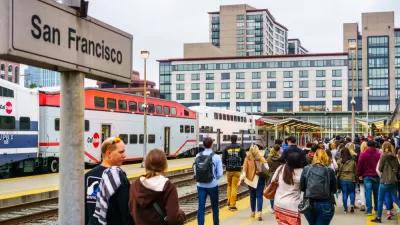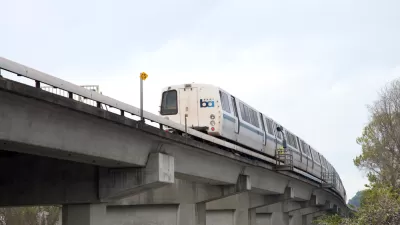How far is BART willing to go to stop people from jumping fare gates? Social media users have called new fare gates "skull crushers" and "inverted guillotines."

Lina Blanco uses the controversy arising from new BART fare gates as an opportunity to discuss hostile architecture and design in the public realm—a discussion with implications for planners as well.
"Urban planning provides tangible evidence of how a region grapples with some of its most pressing issues, whether that's budget shortfalls or a crisis of livability," according to Blanco.
If that's true the Bay Area Regional Transit system is showing a lack of patience and a tendency to violence in reaction to fare evasion, according to the public response to a proposed pilot project to redesign fare gates at a couple of system stops.
Kurt Kohlstedt, digital director and producer for the architecture and design podcast 99% Invisible, is quoted in the article describing the fare gates as a most extreme example of design. "I haven't seen anything that even comes close to the overt hostility of these inverted guillotine prototypes," said Kohlstedt.
"In a viral tweet over the weekend, BART riders expressed their concerns over a recent fare-evasion modification pilot gate spotted at Fruitvale station," writes Blanco. "Many were quick to point out how the preventative effort is a disturbing example of anti-poor, anti-homeless and ableist design. Others called the prototypes an extreme example of hostile architecture."
absolutely no one:@SFBART: pic.twitter.com/kkj4VtI0lj
— lalalina (@LinaBlanco) July 19, 2019
Blanco's tweet referred to the "inverted guillotine" version, but the "skull crusher" version also got attention on Twitter.
While BART has chosen a very particular reaction to fare evasion, many other cities and transit agencies are taking the opposite approach, decriminalizing fare evasion as a tool of discrimination that has always penalized people of color and low income people at higher rates.
Step right up, get your face smashed by BART’s new fare gates. pic.twitter.com/A70z86N5pl
— Brian McGuire (@brianrmcguire) July 2, 2019
FULL STORY: BART's Fare Evasion Crackdown Exposes the 'Deadly Elegance' of Hostile Design

Maui's Vacation Rental Debate Turns Ugly
Verbal attacks, misinformation campaigns and fistfights plague a high-stakes debate to convert thousands of vacation rentals into long-term housing.

Planetizen Federal Action Tracker
A weekly monitor of how Trump’s orders and actions are impacting planners and planning in America.

In Urban Planning, AI Prompting Could be the New Design Thinking
Creativity has long been key to great urban design. What if we see AI as our new creative partner?

King County Supportive Housing Program Offers Hope for Unhoused Residents
The county is taking a ‘Housing First’ approach that prioritizes getting people into housing, then offering wraparound supportive services.

Researchers Use AI to Get Clearer Picture of US Housing
Analysts are using artificial intelligence to supercharge their research by allowing them to comb through data faster. Though these AI tools can be error prone, they save time and housing researchers are optimistic about the future.

Making Shared Micromobility More Inclusive
Cities and shared mobility system operators can do more to include people with disabilities in planning and operations, per a new report.
Urban Design for Planners 1: Software Tools
This six-course series explores essential urban design concepts using open source software and equips planners with the tools they need to participate fully in the urban design process.
Planning for Universal Design
Learn the tools for implementing Universal Design in planning regulations.
planning NEXT
Appalachian Highlands Housing Partners
Mpact (founded as Rail~Volution)
City of Camden Redevelopment Agency
City of Astoria
City of Portland
City of Laramie





























